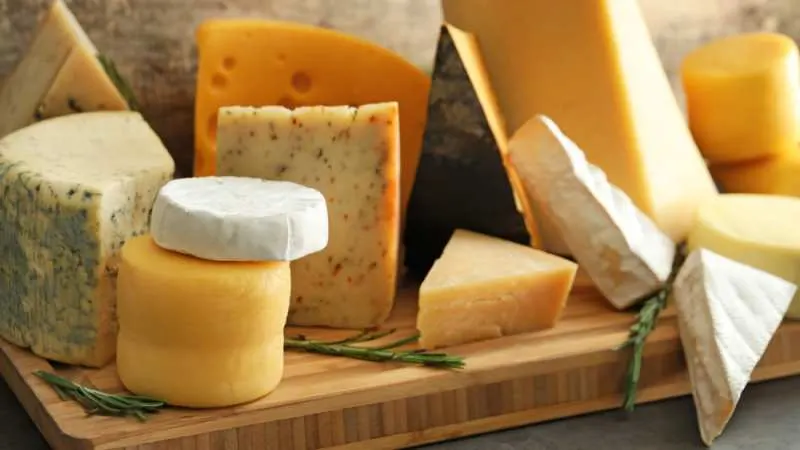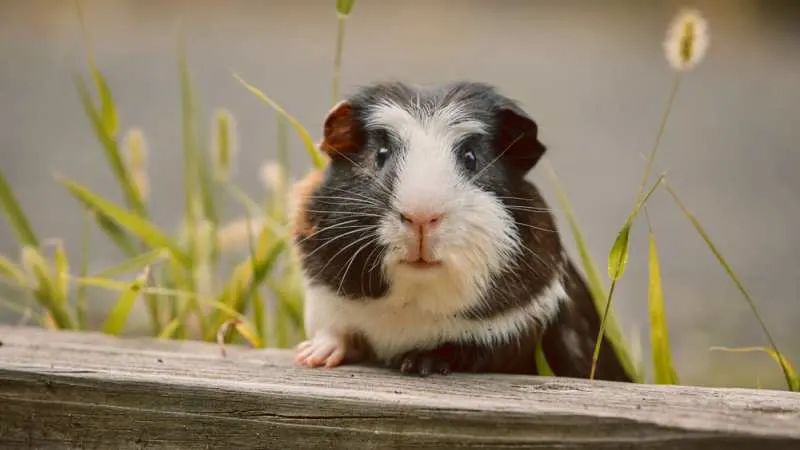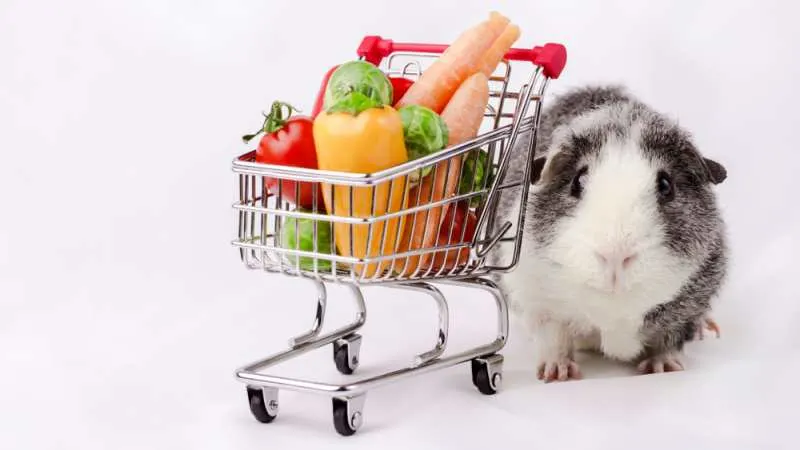Cheese is the all-time favorite food of many of you reading this, young or old. But can guinea pigs eat cheese as humans do?
Well, since guinea pigs aren’t fussy eaters, particularly when they’re younger, you might think that feeding them small amounts of cheese – and giving them an extra dose of nutrients, isn’t that big of a deal.
However, human foods are not necessarily suitable for guinea pigs. And because cheese is a processed food that has never been part of guinea pigs’ natural diet, it is not recommended to offer it to them ever.
A healthy and balanced guinea pig diet comprises only grass hay, fresh fruits and vegetables – and no processed foods.
Continue reading to understand why – and learn which snacks are ideal for your guinea pig!

Cheese Nutritional Information
Cheese is a dairy product made by coagulating milk protein (casein) with an enzyme (rennin) and acid.
Here’s a rundown of some of the nutrients found in cheese:
Cheese contains protein, fat, calcium, magnesium, vitamin A and B, and phosphorus, among other things. These ingredients are all beneficial to humans and are a common part of human cuisine.
Most of us can consume a wide range of dairy products safely.
But as you can guess by now, the same can’t be said for guinea pigs; these nutrients aren’t as healthy for them as one might assume.

Why Can’t Guinea Pigs Eat Cheese?
Guinea pigs are pretty sensitive to cheese. Although a tiny bite of cheese would not hurt your pet, guinea pigs ingesting cheese will face a variety of health issues in the long term – even in modest doses.
Keep reading to learn why!
Lactose
After a certain age, many animals have difficulty digesting milk. The same happens to humans, too.
Most animals in the wild wean themselves off of milk when they’re still babies. Milk is essentially “baby food” that sustains mammals until they’re ready to transition to their “adult” diet – with the added benefit of hastening their maturation.
Guinea pigs are not exempt from this regulation.
Aside from that, cheese is generally created from cow’s milk – although, of course, goat cheese and other varieties and styles of cheese are available.
On that note, remember that cow’s milk is meant for newborn calves – not humans, and certainly not guinea pigs.
When you think about it, given lactose intolerance affects almost one-third of all human adults worldwide, it’s odd that we consume it at all.
Although humans might or might not digest milk well, expecting the same thing of any animal, particularly a rodent, is unrealistic.
The lactose level in cheese varies from 0.1% to 5%, depending on the type of cheese. Lactase is the sole enzyme that can break down lactose into smaller sugar molecules.
That’s the main issue:
Guinea pigs lack lactase in their intestines that would allow them to effectively decompose milk particles, enzymes, or proteins – including lactose.
Nevertheless, guinea pigs receive milk from their moms; their bodies are capable of producing lactase when they are born. But newborn guinea pigs only need their mom to nurse them for a few days.
When guinea pigs get older, they quit drinking their mother’s milk and begin eating a typical diet of vegetables, fruits, and nuts. And as time goes by, their bodies cease producing lactase since there’s no need for it.
To put it simply, all guinea pigs are lactose intolerant, meaning if they consume cheese, these particles may wreak havoc on your pet’s digestive system. They can’t handle the lactose found in cheese, period.
Fat
The second issue is that cheese contains a lot of fat.
It typically includes around 20% saturated fat in each portion, although certain cheese variations might have up to 30% saturated fat.
If cheese is proven to be fattening for people, consider how many calories would be consumed by a little guinea pig if cheese was appropriate for their ingestion.
Guinea pigs are herbivores that will thrive on a diet of hay, vegetables, and, in some instances, mineral supplements. In general, they require minimal calories to live.
They have adapted to ingest a lot of fiber and need it to maintain a functional – and healthy – digestive tract.
Guinea pigs do not thrive – and, therefore, should not be given – foods containing high-fat levels. They’re unable to metabolize them, and consuming them can result in various problems.
They would gain weight and develop obesity – which has its own set of problems and hazards – but would also suffer various other digestive issues, including diarrhea.
They become lethargic when their body weight increases, too, and it’s often tough to get them to engage in physical activity.
Calcium
Cheese is widely recognized for being high in calcium, so it’s a significant provider of it in many people’s diets – but detrimental for our little guinea pigs.
When it comes to guinea pigs, you must be cautious about the quantity they ingest. A guinea pig’s daily calcium needs are pretty modest, and the majority of it derives from its herbivorous diet.
By including cheese in your guinea pig’s meal, you would be feeding your pet with a lethal dose of calcium.
As in many other small animals, excessive consumption of calcium has been linked to urinary illnesses and stones. Calcium accumulates in a guinea pig’s bloodstream and goes to their kidneys.
Protein
Cheese typically contains 20% to 30% of protein per portion.
Protein in humans has the job of mending injured muscles and replacing damaged cells. You would believe that because the protein in cheese is suitable for people, it should be good for guinea pigs, as well.
That’s not quite true, though.
While protein is still required for injured muscle and cell repair in guinea pigs, the daily protein needs of a guinea pig are pretty modest.
Cheese would bring excessive amounts of protein into the digestive tract of guinea pigs, which can be an issue:
Guinea pig digestive tracts are incapable of digesting significant protein levels because they do not develop enough protein-digesting enzymes like omnivores or carnivores.
High protein can be harmful to your guinea pig’s digestive tract, causing diarrhea and bloating.

Cheese Substitutes For Guinea Pigs
Instead of cheese, consider providing your guinea pig with a species-appropriate snack. So, if you’d like to give your guinea pig a break from their standard diet, know that there are several alternative foods they may consume.
It can be a fantastic method to provide diversity while ensuring that they get all their required nutrients. Rule number one to remember here is:
Consider feeding them food their bodies were designed to absorb.
Are Vegan And Diary-Free Cheeses A Good Choice?
If your first thought about cheese substitutes was vegan cheese or dairy-free cheese, you’re wrong:
Vegan cheese, or dairy-free cheese, is a form of cheese manufactured entirely from vegetables or plants, with no animal products. These types of cheese have no lactose and lower levels of cholesterol, saturated fat, protein, and calcium.
At first look, this may appear to be a healthy – and even ideal – meal option for your guinea pig.
The overall fat level of vegan cheese is around 12.5% per serving – which is unquestionably lower than the 20% to 30% of regular, dairy-based cheese. But 31% of that 12.5% fat comes in the form of saturated fat.
If you take a step back, though, you’ll see that a guinea pig’s daily fat consumption demands are relatively low.
As a result, just like conventional cheese, even a tiny amount of vegan cheese can significantly boost calorie consumption for the day.
Aside from that, vegan cheese has a salt level equivalent to dairy cheese. Thus, vegan cheese has the same impact on guinea pig urinary systems as dairy products.
The salt concentration might create significant problems in your young cavy, leading to kidney stones and dehydration.
As a result, vegan cheese creates the same health concerns as dairy cheese and drastically cuts down guinea pigs’ lifespan.
Vegetables
Your cavies can eat a full plate of vegetables every day. They’re high in vitamins and will appeal to your guinea pig.
You can pick items directly from the local market – but make sure they don’t use any herbicides or pesticides that may be damaging to them.
Here are some examples of veggies your guinea pig can eat:
Related Read: Can Guinea Pigs Eat Bell Peppers? Bell Pepper Seeds?
Fruits
Fruits are another excellent snack and could provide your guinea pig with the vitamin C it requires. However, the intake should be limited because of their high sugar content.
They should be given the following fruits:
Related Read:
Hay
Hay is possibly the most significant component of a guinea pig’s nutrition. It contains fiber and helps them wear their teeth down.
So, you better make sure that your guinea pig has an endless supply of hay – because they not only eat it but use it for nesting, too.

Conclusion
Before we wrap up this article, we hope that we managed to assist you in resolving your “can guinea pigs eat cheese” mystery. On that note, here’s a quick reminder:
No, regardless of the age of your guinea pigs, it’s better not to feed them any cheese. There are too many elements that make it an unhealthy and troublesome source of nutrients.
Lactose and milk proteins, higher fat content, and a high calcium level – you get the picture.
Besides, there are much cheaper, healthier, and conveniently accessible options, such as fresh fruits and vegetables, to feed your guinea pig.
These food items will help you increase your pet’s longevity, enabling them to spend more time with you. And isn’t that something we all want?
Providing them with better food increases their lifespan and reduces trips to the veterinarian. It’s a win-win!

